
Pickleball Techniques and Strategies: from Beginner to Champion
From Beginner to Pro: Ace your Play with our Pickleball Techniques & Strategies to Dominate the Court in your Next Game.
 Are you a Pickleball enthusiast who’s been playing the game for a while now? If that’s the case, you probably understand the importance of the Pickleball equipment for your performance on the court. Specifically, Pickleball paddles play an important role in your game. Even for professionals, it can be tough to know when to say goodbye to your old equipment and upgrade to a new paddle in this thriving Pickleball community.
Are you a Pickleball enthusiast who’s been playing the game for a while now? If that’s the case, you probably understand the importance of the Pickleball equipment for your performance on the court. Specifically, Pickleball paddles play an important role in your game. Even for professionals, it can be tough to know when to say goodbye to your old equipment and upgrade to a new paddle in this thriving Pickleball community.
Whether you’re a beginner who just picked up the paddle for the first time or volleying for years, there’s one question to ask that tends to linger: “When is the right time to upgrade your Pickleball equipment?”
In the ever-evolving world of Pickleball equipment, being up-to-date can significantly boost your performance. Think about this: Would a Formula 1 driver race in a ten-year-old car? Definitely not! Much like technology advances Formula 1 cars, it also enhances Pickleball equipment.
As the American author and motivational speaker, Tony Robbins, once said, “Change is inevitable. Progress is optional.” This idea applies to many parts of life, including your Pickleball gear. However, to help you decide if it’s time for an upgrade, let’s look at the signs that indicate you need a change.
First, let’s talk about why your Pickleball paddle matters. Your paddle is a fundamental piece of your equipment that directly influences your performance, comfort, and overall experience. Your paddle also acts like an extension of your arm during the game and affects how you hit the ball. It controls power, precision, and spin. A well-suited paddle can significantly enhance your gameplay, while a worn-out paddle can hold you back.
Despite equipment being properly maintained, over time even the most diligently cared-for paddles can begin to show signs of wear and tear. These signs are crucial to watch out for because they indicate the need for a new paddle. With that in mind, let’s dive into the signs that indicate the need for a new paddle.
Several factors play a role in determining the lifespan of a Pickleball paddle. First, it relies on factors like the materials used and how intense it’s used. It also depends on how well you take care of your Pickleball equipment. Therefore, choosing a high-quality paddle, playing with care, and maintaining it properly can extend its lifespan.
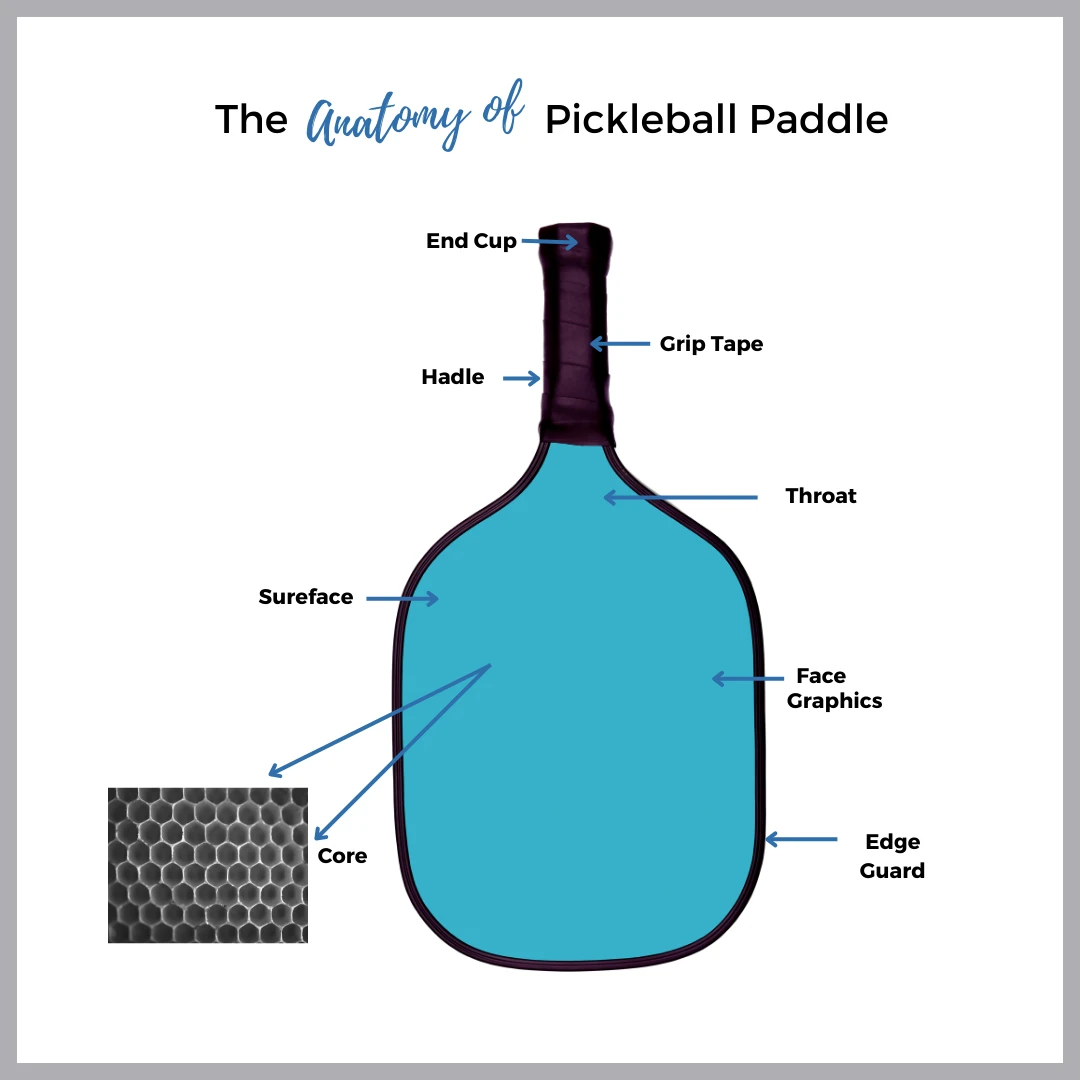 1. Material Quality:
1. Material Quality:
The construction of the paddle depends on the materials used. Paddles made from high-quality materials such as carbon fiber or composite materials tend to last longer than those made from cheaper materials.
2. Core Material:
The core material inside the paddle can affect how long it lasts. Paddles typically have either a polymer or foam core. Polymer cores, in general, last longer and can withstand intense play for longer periods.
3. Edge Guard:
To protect the paddle from getting damaged when it accidentally hits the court or other paddles, having a good-quality edge guard is also important. In the same way, a strong edge guard can extend the lifespan of the paddle.
Paddles that are used more often naturally wear out faster. If you play Pickleball often, it’s important to realize that your paddle won’t last long. As a result, players have to buy new paddles more often.
5. Intensity of Play:
The force with which you strike the ball and your playing style can affect how long the paddle lasts. Players who hit the ball hard and play aggressively can put more stress on the paddle which causes quicker wear and tear.
6. Playing Surface:
Note that the surface where you play can significantly affect how long your paddle lasts. When you play on rough or abrasive courts and often scrape your paddle on the surface, it can make the paddle’s surface wear out faster.
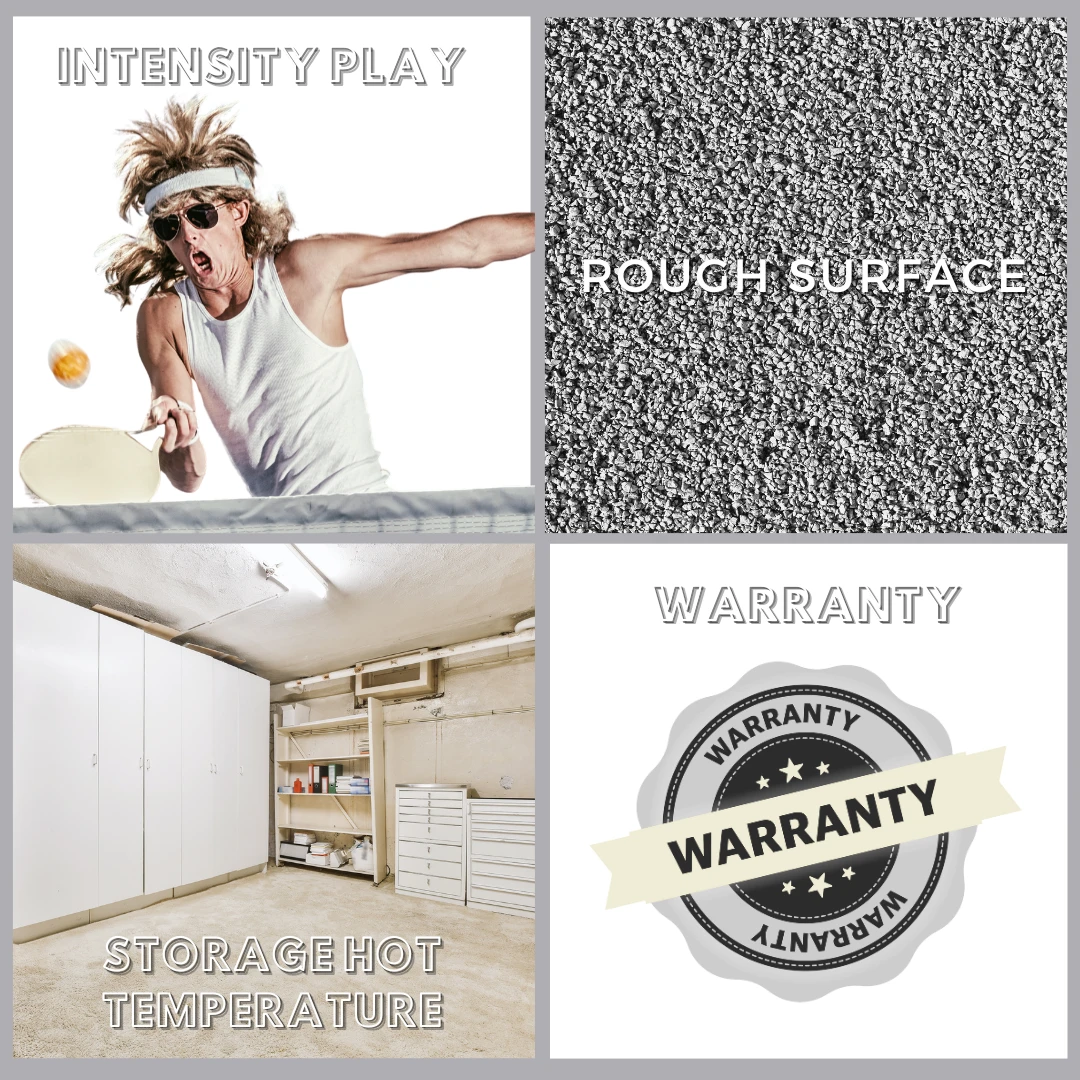 7. Storage:
7. Storage:
Even if paddles are made from high-quality materials, storing them properly is another method to make them last longer. Use a case to protect them from dust, moisture, and physical harm when not in use.
8. Temperature and Humidity:
Extreme temperatures and high humidity can harm your paddle over time. Make sure you don’t expose it directly to harsh conditions such as leaving it in a hot car or a storage area.
9. Maintenance:
Regular maintenance plays a huge role in making a paddle last longer. You should clean it regularly, avoid hitting hard surfaces, and replace the grip when it wears out. Over time, a deteriorated grip can significantly affect your gameplay.
10. Manufacturer’s Warranty:
Many manufacturers offer warranties that protect against defects or damage for a certain period. It’s useful to know the warranty’s terms and conditions should you experience any issues with your paddle.
Now that we understand the significance of the paddle let’s examine some telltale signs that it’s time for an upgrade. After all, the right Pickleball equipment can make all the difference between a win and a loss.
1. Visible Wear and Tear: First, check your Pickleball paddle for any visible signs of wear and tear. Look out for cracks, chips, or scratches, as they can affect how well your paddle performs. If you spot any of these issues, it’s probably time to think about getting a new one.
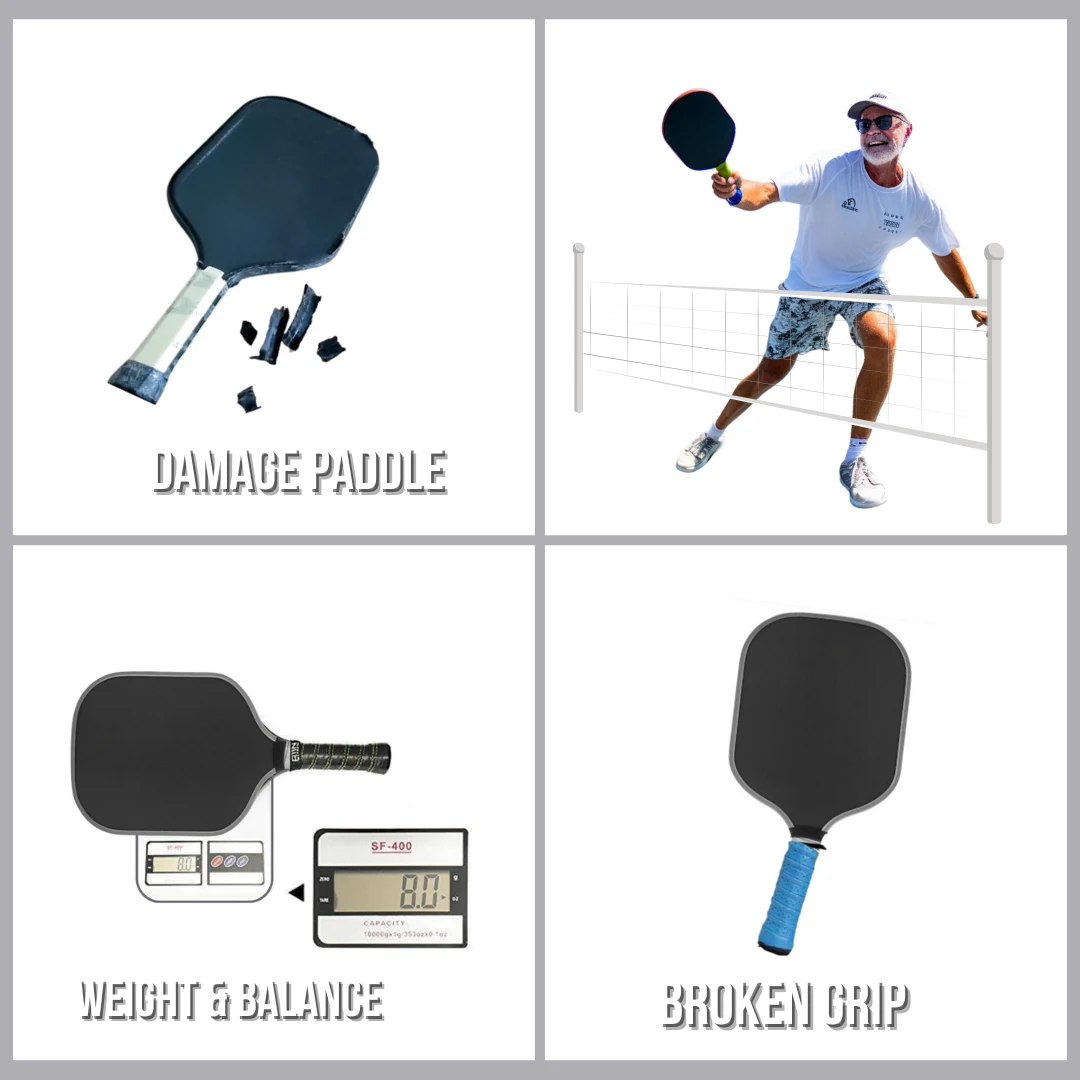 2. Decreased Pop: Consider whether you’ve noticed a decrease in the “pop” of your shots. If your paddle doesn’t respond as well as it used to and you struggle to generate power, it could be because the core material has worn down over time.
2. Decreased Pop: Consider whether you’ve noticed a decrease in the “pop” of your shots. If your paddle doesn’t respond as well as it used to and you struggle to generate power, it could be because the core material has worn down over time.
3. Weight and Balance: Make sure to think about the weight and balance of your paddle. Have your preferences changed as you’ve gained experience? Maybe you now prefer a lighter or more balanced paddle, or you’ve become accustomed particularly to a different grip size.
4. Rule Changes: Stay updated on Pickleball rules and regulations. If there have been any changes that affect paddle specifications, your old one might no longer be allowed for competitive play.
5. Incompatibility with Your Playing Style: Similarly, consider your evolving playing style as you gain experience in Pickleball. If your paddle doesn’t match your style, whether it’s power, control, or skill, it’s time to look for a better-suited option.
6. Skill Level: Lastly, are you struggling to enhance your game despite consistent practice? Sometimes, upgrading your equipment can give you the extra advantage needed to break through a skill level.
Now that you’ve recognized the signs indicating a need for a new Pickleball paddle, the next step is finding the perfect replacement. When you’re shopping for a new paddle, consider your playing style, skill level, and budget. Likewise, don’t hesitate to seek advice from fellow players or consult with experts at your local sporting goods store. Here are some tips to consider:
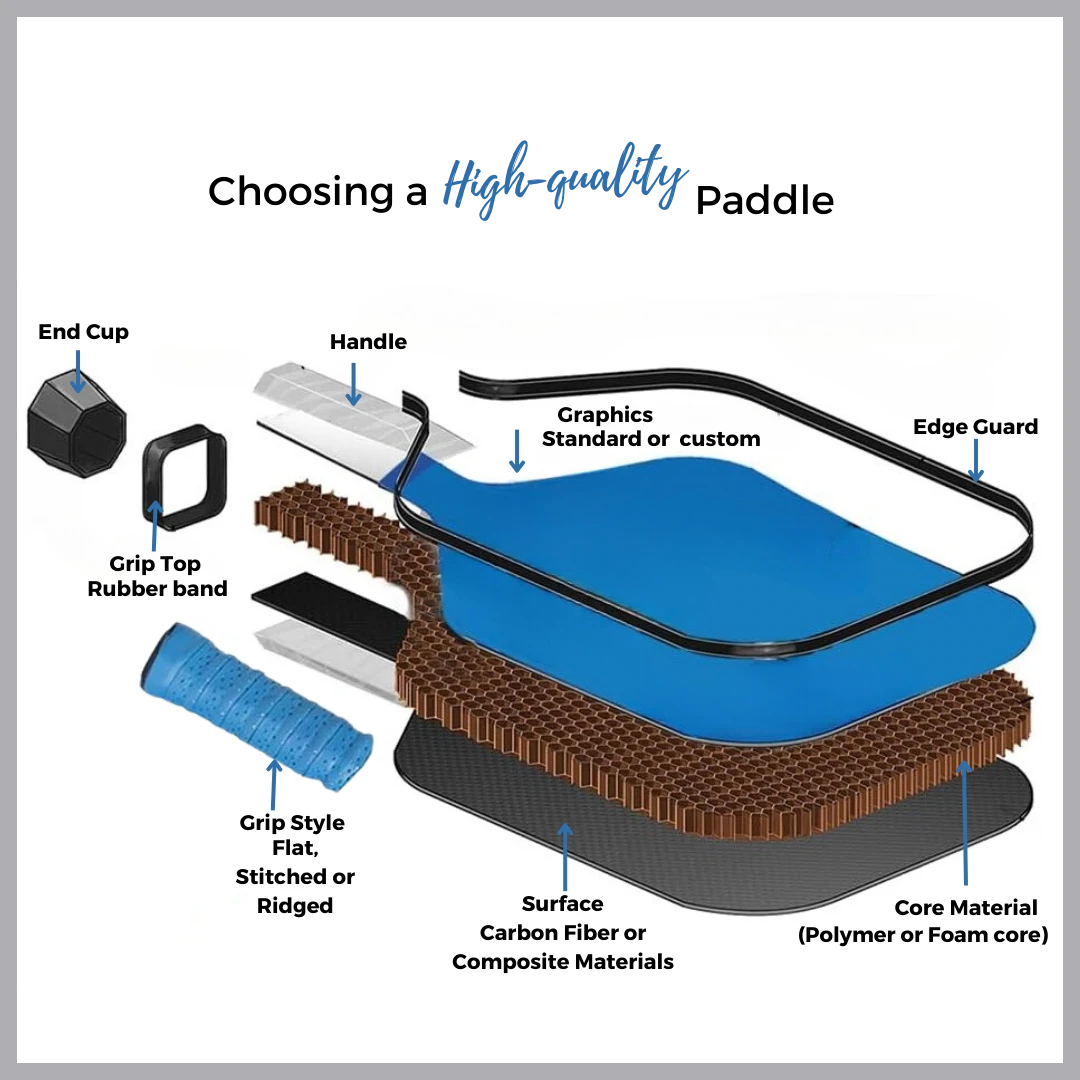 1. Paddle Materials – Firstly, let’s talk about composite paddles. These paddles are usually crafted from materials like fiberglass, carbon fiber, or a blend of the two. They strike a good balance between power and control.
1. Paddle Materials – Firstly, let’s talk about composite paddles. These paddles are usually crafted from materials like fiberglass, carbon fiber, or a blend of the two. They strike a good balance between power and control.
On the other hand, there are wood paddles. These paddles are heavier and provide greater control, but they provide less power as opposed to composite paddles. Meanwhile, polymer core paddles are recognized for their gentle and quiet gameplay and have a strong emphasis on control.
2. Weight – The weight of your paddle can significantly affect your game. Make sure you pick a weight that feels right and matches your playing style, especially during a rally.
For example, if your paddle is Lightweight (7.3-7.8 oz) you’ll get better flexibility and control but less power. On the other hand, a Midweight (7.9-8.4 oz) option strikes a balance between power and control, making it suitable for many players. However, if you go for a Heavyweight (8.5 oz and above), you’ll have more power at your disposal, although it might be less flexible.
3. Grip Size – Make sure the grip feels comfortable in your hand. To help you choose the right size, measure your hand’s circumference. Small grips are typically under 4 inches in circumference. Medium grips measure generally around 4-4.25 inches and large grips are over 4.25 inches.
Choose a paddle grip that offers a comfy hold and reduces vibration.
5. Edge Guard – Indeed, some paddles are designed with edge guards to shield against accidental damage. Therefore, it’s advisable to select a paddle with a durable edge guard if you tend to hit the paddle against the ground or walls.
6. Brand and Model – Well-known brands typically provide a variety of paddle models with advanced features. Therefore, it’s important to know the brand’s reputation and examine reviews regarding specific models. This will help you make a well-informed decision.
7. Noise Level – Some paddles are designed to operate more quietly, which becomes especially important in noise-sensitive areas. Thus, it’s advisable to check whether the paddle includes features aimed at noise reduction.
8. Player Level and Style – Think about your skill level. If you’re just starting, you might prefer a more forgiving paddle. Conversely, advanced players tend to seek a paddle that strikes the right balance between power and control.
Certainly, your playing style also plays a huge role and matters a lot. If you lean towards an aggressive style and enjoy smashing, choose a paddle that delivers more power. Whereas, if skill and control are your primary concerns, then a paddle with a softer touch is a better fit for you.
9. Regulations – Make sure the paddle you pick follows the official Pickleball rules, especially if you plan to participate in authorized tournaments.
10. Price and Warranty – Set a budget for your paddle replacement. Paddles come at various prices, and although pricier ones may offer advanced features, there are also budget-friendly paddles that perform well. Lastly, don’t forget to check the manufacturer’s warranty, as it can give you peace of mind in case of defects or damage.
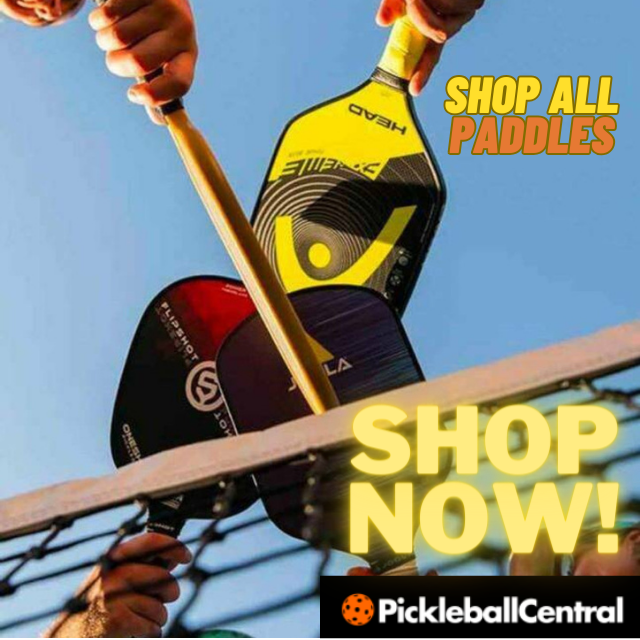 In the constantly changing world of Pickleball, the gear, apparel, and accessories you use can significantly affect your performance. Not to mention, the health benefits it offers and the injury-free experience. Change is something that will happen, but whether you choose to improve is up to you. By identifying when it’s time to get a new Pickleball paddle, you’re on the path to enhancing your skills and increasing your enjoyment of the sport. So, ask yourself “Is it time to upgrade my Pickleball gear?” because your next victory on the court might depend on it.
In the constantly changing world of Pickleball, the gear, apparel, and accessories you use can significantly affect your performance. Not to mention, the health benefits it offers and the injury-free experience. Change is something that will happen, but whether you choose to improve is up to you. By identifying when it’s time to get a new Pickleball paddle, you’re on the path to enhancing your skills and increasing your enjoyment of the sport. So, ask yourself “Is it time to upgrade my Pickleball gear?” because your next victory on the court might depend on it.
Before we end this blog, I’d like to extend a heartfelt thank you to all our readers. Your passion for Pickleball and your dedication to improving your game inspire us to keep creating content that can assist you on your journey. Whether you’re an experienced player or just starting out, we hope this blog has been informative and helpful. Keep hitting those winning shots and enjoying every moment on the pickleball court. Thank you for being a part of our Pickleball community! We’ll see you again in our next Pickleball Blog.

From Beginner to Pro: Ace your Play with our Pickleball Techniques & Strategies to Dominate the Court in your Next Game.

Step into the spotlight, make a lasting impression, and become a trendsetter on the Pickleball court with our Pickleball apparel guide.

Thinking about the perfect gift for someone just starting in Pickleball? Discover our Pickleball gift guide tailored for beginners. Look no further.

Ever wondered how your Pickleball style could reach new heights? Learn the secrets of success with the “Pickleball Accessories To Enhance Your Play and Ace Your Style”.
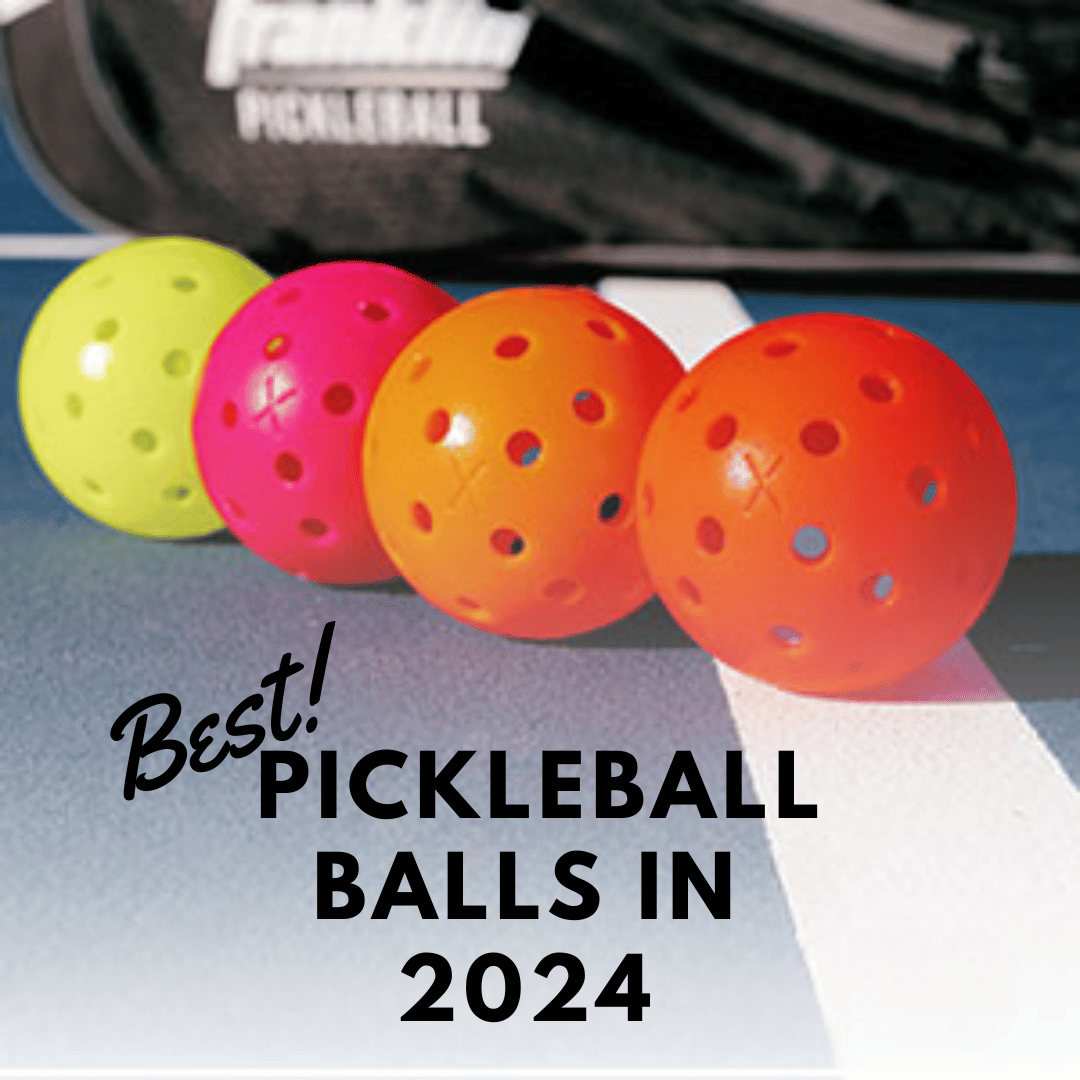
Are you seeking the perfect Pickleball balls for 2024? Let’s find out why they’re the “Best Pickleball balls for 2024”.
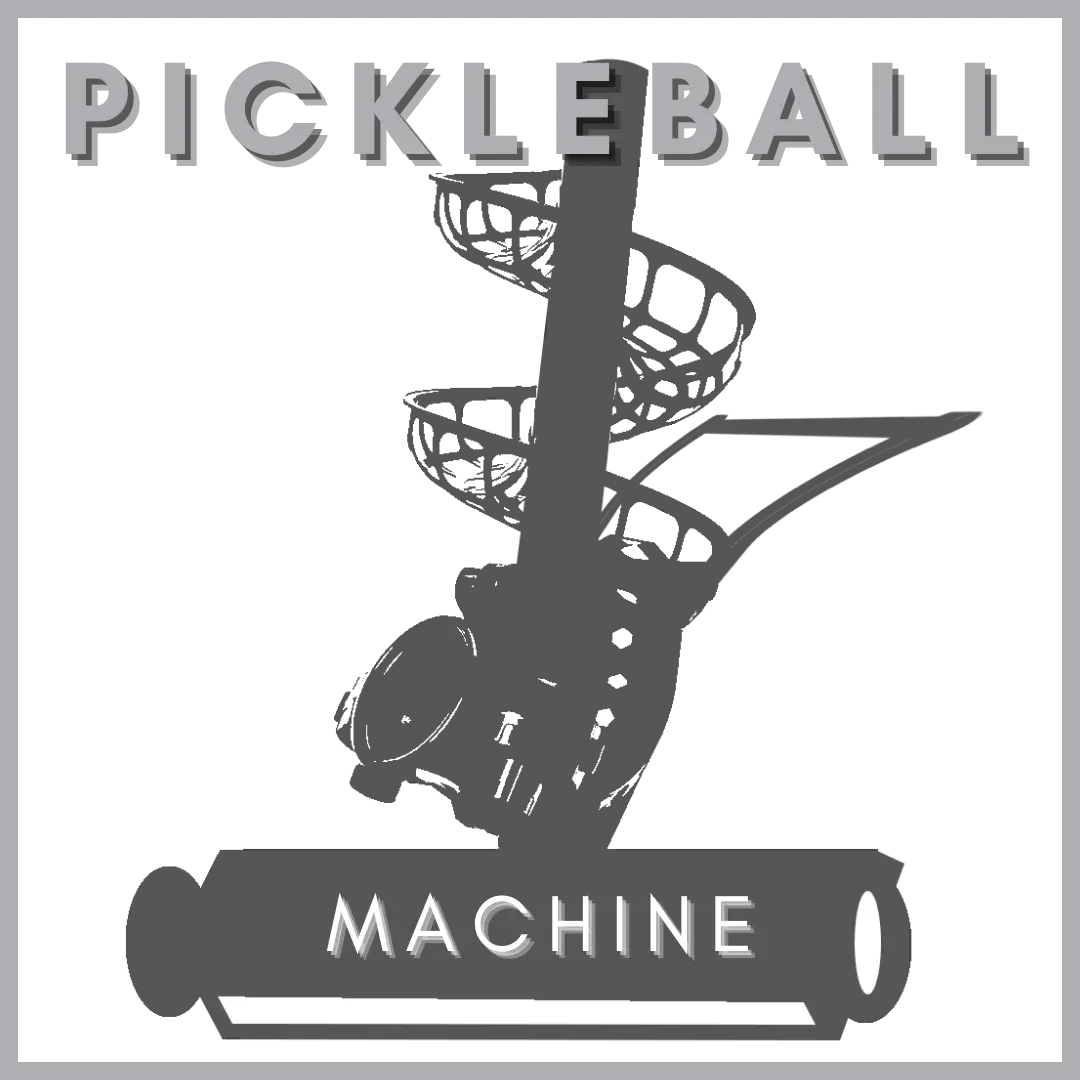
Looking to boost your pickleball skills? How can Pickleball Machines serve as your secret weapon?
If you would like us to feature your brand in our upcoming Pickleball blogs, Collaborate with Us. We’d love to have you featured.